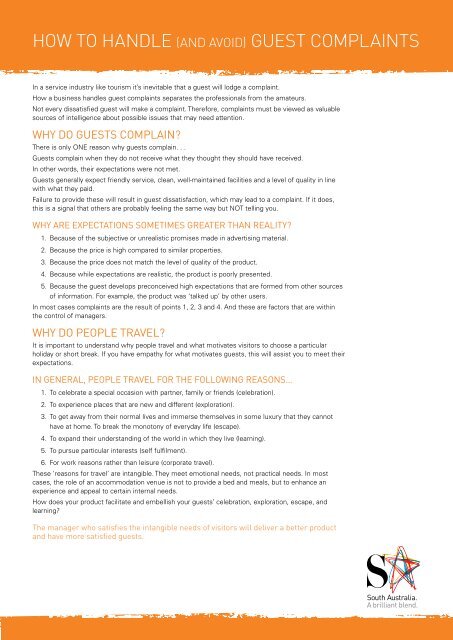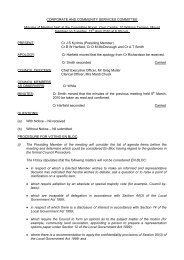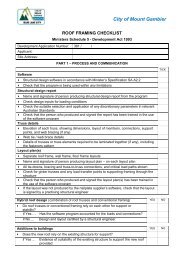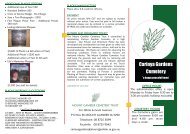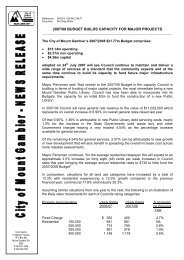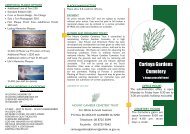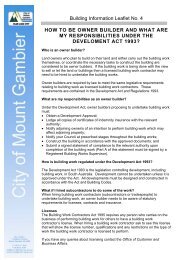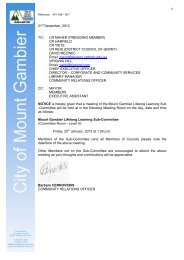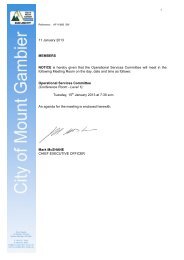How to Handle Guest Complaints - Mount Gambier Tourism
How to Handle Guest Complaints - Mount Gambier Tourism
How to Handle Guest Complaints - Mount Gambier Tourism
You also want an ePaper? Increase the reach of your titles
YUMPU automatically turns print PDFs into web optimized ePapers that Google loves.
<strong>How</strong> <strong>to</strong> handle (and avoid) <strong>Guest</strong> <strong>Complaints</strong><br />
In a service industry like <strong>to</strong>urism it’s inevitable that a guest will lodge a complaint.<br />
<strong>How</strong> a business handles guest complaints separates the professionals from the amateurs.<br />
Not every dissatisfied guest will make a complaint. Therefore, complaints must be viewed as valuable<br />
sources of intelligence about possible issues that may need attention.<br />
Why do guests complain?<br />
There is only ONE reason why guests complain. . .<br />
<strong>Guest</strong>s complain when they do not receive what they thought they should have received.<br />
In other words, their expectations were not met.<br />
<strong>Guest</strong>s generally expect friendly service, clean, well-maintained facilities and a level of quality in line<br />
with what they paid.<br />
Failure <strong>to</strong> provide these will result in guest dissatisfaction, which may lead <strong>to</strong> a complaint. If it does,<br />
this is a signal that others are probably feeling the same way but NOT telling you.<br />
Why are expectations sometimes greater than reality?<br />
1. Because of the subjective or unrealistic promises made in advertising material.<br />
2. Because the price is high compared <strong>to</strong> similar properties.<br />
3. Because the price does not match the level of quality of the product.<br />
4. Because while expectations are realistic, the product is poorly presented.<br />
5.<br />
Because the guest develops preconceived high expectations that are formed from other sources<br />
of information. For example, the product was ‘talked up’ by other users.<br />
In most cases complaints are the result of points 1, 2, 3 and 4. And these are fac<strong>to</strong>rs that are within<br />
the control of managers.<br />
Why do people travel?<br />
It is important <strong>to</strong> understand why people travel and what motivates visi<strong>to</strong>rs <strong>to</strong> choose a particular<br />
holiday or short break. If you have empathy for what motivates guests, this will assist you <strong>to</strong> meet their<br />
expectations.<br />
In general, people travel for the following reasons…<br />
1. To celebrate a special occasion with partner, family or friends (celebration).<br />
2. To experience places that are new and different (exploration).<br />
3.<br />
To get away from their normal lives and immerse themselves in some luxury that they cannot<br />
have at home. To break the mono<strong>to</strong>ny of everyday life (escape).<br />
4. To expand their understanding of the world in which they live (learning).<br />
5. To pursue particular interests (self fulfilment).<br />
6. For work reasons rather than leisure (corporate travel).<br />
These ‘reasons for travel’ are intangible. They meet emotional needs, not practical needs. In most<br />
cases, the role of an accommodation venue is not <strong>to</strong> provide a bed and meals, but <strong>to</strong> enhance an<br />
experience and appeal <strong>to</strong> certain internal needs.<br />
<strong>How</strong> does your product facilitate and embellish your guests’ celebration, exploration, escape, and<br />
learning?<br />
The manager who satisfies the intangible needs of visi<strong>to</strong>rs will deliver a better product<br />
and have more satisfied guests.
What do people complain about?<br />
The South Australian <strong>Tourism</strong> Commission receives many complaints about <strong>to</strong>urism<br />
opera<strong>to</strong>rs. Here are some general examples:<br />
1. “We did not receive what was promised in the advertisement”<br />
This relates <strong>to</strong> things like ‘home-made biscuits and wine on arrival’ not being provided, ‘generous<br />
cooked breakfast’ when only continental provisions are supplied, ‘spacious’ when the rooms are<br />
small, ‘two-person spa’ when the spa was located in cottage ‘A’ and guests were given cottage ‘B’.<br />
Message: Deliver what you promise. Deliver more than you promise. If you can’t deliver it<br />
every time without fail, do not promise it!<br />
2. “The condition of the property was very poor”<br />
This relates <strong>to</strong> windows that don’t open or don’t lock, lights that don’t work, missing cutlery,<br />
heating or cooling that doesn’t work and so on.<br />
If you are renting a shack, you do not expect a 5 star property. If the ‘shack’ is advertised as an<br />
‘ultimate beachside villa’ then anything less than perfect will be a disappointment.<br />
Message: Keep your property maintained. There is NO excuse for offering broken-down<br />
services <strong>to</strong> guests. Reduce your price if you cannot justify the level of quality that you have<br />
promised.<br />
3. “The property was not clean”<br />
This usually relates <strong>to</strong> the bathroom and kitchen areas not being clean, discoloured tile grout, hair<br />
in the drain, soap scum on the glass shower screen, blankets dusty or stained, floors sticky.<br />
The property may have been cleaned after last use but if it is not used again for some weeks,<br />
spiders, dust and general stuffiness will detract.<br />
Message: Consumers expect a high level of cleanliness for all standards of accommodation.<br />
There is NO excuse for a poor level of cleanliness. Keeping a property clean requires<br />
good processes - cleaners rostered at the right time, with the right skills and equipment.<br />
Remember, it may be necessary <strong>to</strong> open up and dust and remove spider webs before a<br />
guest’s arrival.<br />
4. “The service we received was terrible”<br />
This relates <strong>to</strong> the attitude of the people providing the service. It is often about inflexibility or poor<br />
training. The owner was rude. The owner would not listen. The staff could not be found when I<br />
needed them.<br />
Message: The guest may not always be right, but in their minds they are. It is the guest who<br />
is paying, so treat them with respect and be empathetic. Or better still, objectively assess<br />
whether they have a point, and if possible, fix the problem so that no more guests will have<br />
cause <strong>to</strong> complain about that issue again.
Dos and Don’ts<br />
When responding <strong>to</strong> guest complaints, here are some guidelines <strong>to</strong> assist you <strong>to</strong> effectively resolve<br />
the situation, preventing any ongoing dispute:<br />
Do . . .<br />
• Listen <strong>to</strong> the guest. Acknowledge the issue they raise and show empathy for the problem.<br />
• Promise <strong>to</strong> act on the feedback they have given.<br />
• Tell the guest their complaint will result in improvement <strong>to</strong> your business.<br />
• Thank the guest for providing feedback <strong>to</strong> you.<br />
• Consider refunds (full or partial). It is better <strong>to</strong> give comfort than <strong>to</strong> have a long-term negative ambassador for<br />
your business. It also demonstrates that you are serious about addressing the problem.<br />
• Act on a permanent solution <strong>to</strong> the issue. If one guest raises a matter, you can be sure that others are also<br />
experiencing it but not telling you.<br />
• Respond <strong>to</strong> written complaints in writing as soon as possible.<br />
• Include agents in your response if the guest has booked this way. Be proactive and demonstrate that you have<br />
acted positively.<br />
Don’t . . .<br />
• Be defensive and give excuses. Accept what is said and move on.<br />
• Tell the guest that they are the first person ever <strong>to</strong> mention this problem.<br />
• Take the feedback personally. This is sometimes hard but rarely is the complaint about you. It is about what<br />
your valued guest did not get.<br />
• Get upset with or show annoyance with the guest, either face <strong>to</strong> face or in writing.<br />
• Ignore the complaint but be objective and act were possible.<br />
Legal Responsibilities<br />
Consumers are entitled <strong>to</strong> receive what was promised them. They also have basic rights under<br />
consumer protection legislation.<br />
This particularly relates <strong>to</strong> the contract (written or verbal) between you and the guest. If this is<br />
breached, the guest can rightly ask the Office of Consumer and Business Affairs <strong>to</strong> investigate. They<br />
have powers <strong>to</strong> prosecute when breaches of the Acts, for which they administer, occur.<br />
Be familiar with your responsibilities. The Office of Consumer and Business Affairs website contains<br />
very good information: www.ocba.sa.gov.au<br />
7 Steps <strong>to</strong> Eliminate <strong>Complaints</strong> and Increase<br />
Repeat Business<br />
1. Promise only what you can deliver<br />
• Review advertising material for accuracy<br />
• Avoid the use of words that are ambiguous.<br />
• If you use words that are subjective like ‘unique’, ‘generous’, ‘romantic’ and ‘luxury’ remember that people<br />
have different expectations of what these mean. What you deliver must exceed their expectations or you risk a<br />
dissatisfied guest.<br />
2. Determine the market price<br />
• Review competi<strong>to</strong>rs’ products and prices.<br />
• Understand what consumers get for the same amount of money in other properties. Include hotels and motels<br />
and B&Bs.<br />
• <strong>Guest</strong>s want ‘value’ from any purchase.<br />
3. Reserve some surprises.<br />
• Give something that the guest was not expecting.<br />
• Over-deliver.<br />
4. Adopt a ‘the guest is always right’ attitude<br />
• Do not dispute or disagree without viewing the issue from the cus<strong>to</strong>mer’s perspective.<br />
• Respect the guest’s opinion.<br />
• Promise <strong>to</strong> do all you can <strong>to</strong> rectify.<br />
• It is better <strong>to</strong> refund, retreat and res<strong>to</strong>re guest confidence than <strong>to</strong> have that guest tell all their friends (and<br />
others) about their bad experience.
5. Establish a continuous guest feedback system (see The Feedback Loop below)<br />
• Encourage guests <strong>to</strong> tell you about their stay.<br />
• Do not rely on a ‘visi<strong>to</strong>rs book’ for this purpose.<br />
• Ask them <strong>to</strong> help you improve your service for others by completing a survey.<br />
• Accept what they tell you.<br />
• Act on their suggestions where practical.<br />
• It is better <strong>to</strong> refund, retreat and res<strong>to</strong>re guest confidence than <strong>to</strong> have that guest tell all their friends (and<br />
others) about their bad experience<br />
6. Moni<strong>to</strong>r feedback<br />
• Log and collate the feedback you receive.<br />
• Look for trends and patterns.<br />
7. Respond <strong>to</strong> feedback positively<br />
• It is the feedback that you receive that allows you <strong>to</strong> improve your business. It’s the feedback you do not<br />
receive that does damage without you being able <strong>to</strong> react.<br />
• Always respond positively and courteously.<br />
• Do not make excuses.<br />
• Promise <strong>to</strong> act. In most cases consumers want <strong>to</strong> see that their feedback will make a difference and improve<br />
the experience for others.<br />
The Feedback Loop<br />
This is an important <strong>to</strong>ol <strong>to</strong> ensure that you are meeting all guests’ expectations. It means providing all<br />
guests with the opportunity <strong>to</strong> tell you how they enjoyed their stay and what, if anything, could have<br />
made their stay more enjoyable.<br />
A visi<strong>to</strong>rs’ book is not suitable for this purpose. You need <strong>to</strong> directly engage the guest <strong>to</strong> provide you<br />
with specific information.<br />
A regular flow of feedback will:<br />
• Encourage people <strong>to</strong> tell you what they think<br />
• Highlight all issues, large and small<br />
• Provide you with the opportunity <strong>to</strong> improve your service<br />
• Prevent issues that lead <strong>to</strong> formal complaints<br />
• Improve your business and increase your sales<br />
The system should be:<br />
• Written and private so that the guest can complete it without any pressure<br />
• Systematically handed out and systematically collected, for example given with breakfast on last day of stay or<br />
upon check out<br />
• Succinct and simple <strong>to</strong> complete – tick boxes<br />
• Easy for you <strong>to</strong> collate<br />
Suggested questions for a feedback loop:<br />
• <strong>How</strong> did you hear about us?<br />
• What encouraged you <strong>to</strong> stay with us?<br />
• Please rate the following:<br />
Your room : ■ Very satisfied ■ Satisfied ■ OK ■ Unsatisfied ■ Very unsatisfied<br />
Our service : ■ Very satisfied ■ Satisfied ■ OK ■ Unsatisfied ■ Very unsatisfied<br />
Breakfast : ■ Very satisfied ■ Satisfied ■ OK ■ Unsatisfied ■ Very unsatisfied<br />
Be sure <strong>to</strong> wrap the survey in an introduction that welcomes feedback, demonstrates your interest in<br />
their views and demonstrates that your business<br />
will be improved if feedback is provided.<br />
For further assistance, contact the SATC <strong>Tourism</strong> Development Group,<br />
South Australian <strong>Tourism</strong> Commission, Ph 8463 4500 or visit www.<strong>to</strong>urism.sa.gov.au<br />
© South Australian <strong>Tourism</strong> Commission 2007


